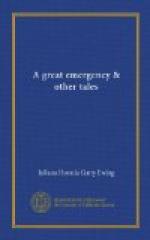The second day I was there, one of the boys came up to me and said, with a mock ceremony and politeness which unfortunately took me in, “If I am not mistaken, sir, that esteemed lady, your mother, is an Honourable?”
He was nearly five years older than I; his name was Weston; he had a thin cadaverous face, a very large nose, and a very melancholy expression. I found out afterwards that he was commonly called “the clown,” and was considered by boys who had been to the London theatres to surpass the best professional comic actors when he chose to put forth his powers. I did not know this then. I thought him a little formal, but particularly courteous in his manner, and not wishing to be behindhand in politeness, I replied, with as much of his style as I could assume, “Certainly, sir. But that is because my father was an Honourable. My father, sir, was the most honourable of men.”
A slight spasm appeared to pass over Weston’s face, and then he continued the conversation in a sadder tone than the subject seemed to require, but I supposed that this was due to his recalling that my father was dead.
I confess that it did not need many leading inquiries to draw from me such a narrative of my father’s valour and high principle, as well as the noble sentiments and conspicuous bravery which have marked our family from Saxon times, as I was well accustomed to pour forth for the edification of our nursemaids. I had not proceeded far, when my new friend said, “Won’t you walk in and take a seat?” It was recreation time, and the other boys were all out in the playground. I had no special friend as yet; Rupert had stuck to me all the first day, and had now left me to find my own level. I had lingered near the door as we came out, and there Weston had joined me. He now led me back into the deserted school-room, and we sat down together on an old black oak locker, at the bottom of the room.
How well I remember the scene! The dirty floor, the empty benches, the torn books sprinkled upon the battered desks, the dusty sunshine streaming in, the white-faced clock on the wall opposite, over which the hands moved with almost incredible rapidity. But when does time ever fly so fast as with people who are talking about themselves or their relations?
Once the mathematical master passed through the room. He glanced at us curiously, but Weston’s face was inscrutable, and I—tracing some surprise that I should have secured so old and so fine-mannered a boy for a friend—held up my head, and went on with my narrative, as fluently as I could, to show that I had parts which justified Weston in his preference.
Tick, tack! went the clock. Click, clack! went my tongue. I fear that quite half-an-hour must have passed, when a big boy, with an open face, blue eyes, and closely curling fair hair, burst in. On seeing us he exclaimed, “Hulloh!” and then stopped, I suspect in obedience to Weston’s eyes, which met his in a brief but expressive gaze. Then Weston turned to me.




